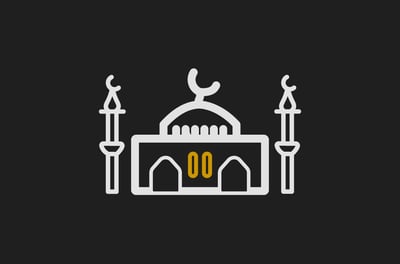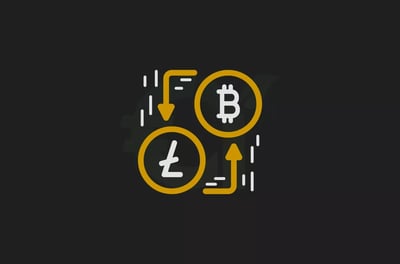Table Of Contents
- Is FOREX Trading Halal or Haram?
- What Are Islamic Considerations in Trading?
- Is Islamic FOREX Trading Halal if it Ensures the Following:
- What is Halal Trading (Islamic Trading)?
- The Islamic perspective on FOREX trading: Is FOREX trading Halal or Haram?
- The Islamic perspective on stock trading: Is stock trading Halal or Haram?
- The Islamic perspective on cryptocurrency trading: Is crypto trading Halal or Haram?
- The Islamic perspective on leverage trading: Is leverage Halal or Haram?
- What is The Difference Between an Islamic Account and a Regular Account?
- How to Choose a Halal Broker
- What is an Overnight Swap Fee, and Is It Halal?
- How to open an Islamic Trading account
- Is CFD trading Halal or Haram?
- The Bottom Line
FOREX Trading: Halal or Haram? An Islamic Trader's Guide
Followers of the Islamic faith make up a large proportion of FOREX traders in the world today. It is important for them to trade in a manner that is compliant with the doctrines of their faith. Therefore, the question must be asked: is FOREX trading halal? Asked another way, is FOREX trading compliant with the teachings of the Holy Quran?
In this article, we will discuss the most important elements of Islamic trading, while answering the key question about whether FOREX trading is halal or not. It is vital to note that while we offer you commonly accepted interpretations of Sharia finance, we do not claim to be the ultimate authority on these matters. If you are still unsure, please seek advice from religious scholars.
FOREX trading is considered halal if it avoids interest payments and complies with Sharia finance rules
Islamic accounts are swap-free and do not charge or pay rollover interest on overnight positions
Traders must avoid CFDs, bonds, and futures as they conflict with Islamic principles of shared risk and immediate settlement
Currencies tied to high interest rates or unstable economies may be restricted in halal trading environments
Brokers compensate for the absence of swap fees by widening spreads or adding administrative charges
Hand-to-hand trading has been reinterpreted to mean rapid execution and immediate cost settlement in digital trades
Brokers offering Islamic accounts must still meet high standards for liquidity, regulation, and platform quality
Choosing a Sharia-compliant broker allows Muslim traders to participate in the market without compromising their faith

Is FOREX Trading Halal or Haram?
The question of whether FOREX trading is halal (acceptable) or haram (unacceptable) within Sharia law generates much debate, which is why it is a good idea to state the commonly accepted positions. Within the teachings of Islam, you are allowed to pursue activities that lead to the enhancement and improvement of your personal financial situation. This means that seeking to augment your financial standing through FOREX trading is acceptable. Therefore, FOREX trading is halal.
Keep in mind that even though Islamic traders do not pay swap fees or interest, they will still be charged the trading fees, margin, and commissions related to trading with a FOREX broker. Also, to make up for not billing you swap fees, brokers will normally inflate the spreads between currency pairs, which compensates them for lost swap-fee income, but means Islamic spreads will never be as tight as regular spreads. We will explain the significance of interest payments in the next section.
As to the legality of FOREX trading in Islamic countries, you will find that trading FOREX is legal in all MENA countries. You simply need to ensure that you deal with regulated brokers who are licensed by the local authorities. When you start trading with a Sharia-compliant account, consult your broker on the rules around trading in the country of your residence.
What Are Islamic Considerations in Trading?
When it comes to FOREX, many Muslim traders face the challenge of aligning modern trading practices with Islamic Sharia principles. The question isn’t just whether profit can be made, but whether the methods behind it are permissible under the rules of fairness, transparency, and ethical conduct. Below are the key issues that often arise when evaluating FOREX trading through the lens of Islamic finance:
Swap fees (overnight fees)In conventional FOREX, swap fees are interest charges applied when positions are held overnight. Under Sharia, charging or paying interest (Riba) is prohibited, making standard swaps impermissible. Many brokers offer “Islamic accounts” that remove swaps to comply with this rule.
Ensuring risk and profit sharingIslamic finance emphasizes fairness, meaning both risk and profit should be shared between parties. This ensures that no one side benefits unfairly at the expense of another. FOREX contracts that structure this balance can be considered compliant.
High-risk assets (Gharar)Gharar refers to excessive uncertainty or ambiguity in contracts. Trades where outcomes are highly unpredictable or speculative fall into this category. Islamic law discourages such contracts, as they can resemble gambling rather than business.
Avoiding illegal or unethical investmentsInvesting in companies or products tied to alcohol, gambling, or weapons violates Sharia rules. Traders must ensure that their activities and counterparties do not profit from prohibited industries. This rule extends to derivatives linked to non-permissible assets.
LeverageLeverage magnifies both gains and losses, often involving borrowing with interest. This not only raises risk but also introduces Riba, making it problematic under Sharia law. Some brokers attempt to structure interest-free leverage, but scrutiny is needed.
SpeculationSpeculation is distinct from informed trading. When it becomes excessive, more like betting on random price moves, it edges into Haram territory. Sharia requires trades to have a clear, tangible purpose and basis in real value.
Margin tradingMargin accounts allow traders to borrow capital to increase trade size, but borrowing usually comes with interest charges. This creates both Riba and Gharar risks. To comply with Islamic principles, traders must avoid interest-based margin systems.
Recommended Brokers
Is Islamic FOREX Trading Halal if it Ensures the Following:
For many Muslim traders, FOREX can be permissible if the trading structure respects Sharia principles. The following conditions are often used as a guideline to determine whether the activity can be considered Halal:
No overnight swaps (no holding positions overnight with interest)A key requirement is the elimination of swap fees, also known as overnight interest. These charges, applied when trades are held open overnight, fall under Riba and are prohibited in Islamic law. Many brokers offer swap-free or “Islamic accounts” to resolve this.
Trading without margin or trading with low leverage without swapsTrading with excessive leverage involves borrowing with interest, which directly conflicts with Sharia rules. However, trading without margin, or with low leverage in a swap-free structure, can be permissible as long as no interest charges are applied and risk is fairly shared.
No gambling or speculationIslamic law strictly prohibits gambling (Maisir), and this extends to speculative trades that are more about betting on random price movements than informed decisions. Trades must be based on knowledge, strategy, and a clear purpose rather than chance.
Avoiding high-risk assetsSharia prohibits Gharar, transactions with excessive uncertainty or ambiguity. This means avoiding highly volatile or exotic assets where outcomes are unpredictable. Instruments that carry disproportionate risk or lack transparency would fall into the Haram category.
Restrictions to Note
Many brokers do not permit Islamic traders to buy selected exotic currencies, such as the Argentine peso. This is because certain exotic currencies are used in countries that often have high interest rates. It is, therefore, haram for traders to be associated with these currencies. This list changes all the time, so you are advised to check with your broker. Sharia-compliant traders who are on the ball will usually volunteer this information to you, so you don’t have to go looking for it.
Another restriction is that Islamic trading does not allow Contract for Difference (CFD) trading. Remember that you are not buying a product or the underlying asset of a type of instrument. With CFD trading, you are trying to predict how the price will change in the future so that you can benefit from making the correct prediction. This is not acceptable according to Sharia finance as you are not taking an equal share in the risk of the transaction, a fundamental item to consider before entering any investment transaction as an Islamic trader.
Two important assets that you cannot trade as an Islamic trader are bonds and treasury bills. This is because bonds are issued based on a fixed interest rate, the proceeds of which will be paid at the end of the life of the bond. This is against Islamic finance law. By the same token, futures contracts are in contravention of Sharia law as the exchange of goods happens on a date in the future, breaking the hand-to-hand principle, which is the idea in Sharia finance that transactions must take place hand-to-hand, or in the moment in the same physical place.
What is Halal Trading (Islamic Trading)?
There are some important structures to comply with when trading according to Islamic principles, but one cardinal rule stands above others: it is forbidden for an Islamic trader to earn or pay interest. Brokers charge regular traders an interest facility for keeping unclosed positions open overnight. For example, with day trading, many traders maintain open positions for short periods of time, often a few hours or less. However, some traders must keep their positions open for longer than 24 hours. In this case, it is accepted practice for traders to pay interest to the broker for this facility, otherwise known as a rollover fee or swap fee. In Sharia finance, this customary practice is prohibited. We will discuss swap fees in more detail later in the article.
Interest payments for keeping overnight positions open are normal for regular traders, but for followers of the Islamic faith, they are simply not allowed. This is where Islamic brokers come to the fore, as they have developed accounts that comply with the requirements of halal Islamic trading, while staying away from and advising their clients to stay away from what is haram.
There are additional regulations that must be followed to remain compliant with Sharia finance. We will discuss these in more detail in later sections. However, it is vital to remember that receiving or paying interest is a touchstone matter to navigate when an Islamic trader starts their career.
The Islamic perspective on FOREX trading: Is FOREX trading Halal or Haram?
FOREX trading can be considered halal if it is done under strict Sharia-compliant conditions. That means no overnight swaps, no interest-bearing charges, and trades carried out in a transparent way that mirrors “hand-to-hand” transactions. However, when speculation, leverage, or interest enters the picture, FOREX risks crossing into haram territory.
The Islamic perspective on stock trading: Is stock trading Halal or Haram?
Stock trading is generally halal when investors buy shares in companies that operate within permissible industries and avoid interest-based income. As long as traders share equally in both risk and reward, and the company’s activities are not tied to haram sectors like alcohol, gambling, or weapons, stock trading aligns with Islamic finance principles. Problems arise only when speculation or unethical businesses are involved.
The Islamic perspective on cryptocurrency trading: Is crypto trading Halal or Haram?
Crypto trading remains one of the most debated issues among Islamic scholars. Some view it as halal because it involves the direct exchange of assets, much like currencies. Others argue it is haram because of extreme volatility, speculation, and the lack of intrinsic value. For now, the permissibility often comes down to how the trader uses crypto—responsibly as an asset or recklessly as a gamble.
The Islamic perspective on leverage trading: Is leverage Halal or Haram?
Leverage is problematic under Islamic law because it often involves borrowing with interest, which directly contravenes Sharia finance. Even when swaps are removed, using high leverage can tip trading into the sphere of excessive risk (gharar), which is not allowed. To remain halal, Muslim traders are advised to avoid or minimize leverage and trade only with capital they fully own.
Recommended Brokers

What is The Difference Between an Islamic Account and a Regular Account?
An Islamic FOREX account pays close attention to the requirements of the Islamic faith and the stipulations of the Quran. Brokers must ensure that none of the features of any account they offer disagree with the teachings of Islam.
As we have said, rollover fees cannot be charged if an account is to be considered halal. Islamic accounts are often called swap-free accounts. These accounts differ from normal accounts in several important ways. Before we proceed, let us further understand why it is necessary to structure Islamic FOREX accounts in this way. In Islam, the concept of “hand-to-hand" trading refers to the bygone practice of completing transactions face to face, in one sitting, so that interest does not become necessary.
However, with the changes in the way business is done, resulting in electronic transactions happening across vast distances and across different markets, Islamic experts have said that hand-to-hand trading is no longer possible but must be supplanted by a new trading equivalent that operates the same way as completing a transaction in the same session. Clearly, this poses challenges in the context of an overnight interest charge.
Islamic-compliant transactions in the FOREX world must be conducted rapidly so currencies can be transferred without hold-ups. All costs and fees must be paid immediately in a manner that closely mirrors hand-to-hand trading. However, it is not always a good idea for Islamic traders to close their positions so quickly, as they will sometimes need to keep their positions open overnight to maximize their profit-making odds.
To allow this, brokers do not charge rollover fees but instead offer a swap-free account option. This exemption makes all the difference because, without it, Muslim traders would not be able to take part in the FOREX trading world.
On the other hand, a regular FOREX trading account is the standard account type offered by most brokers, without any special adjustments for religious compliance. Unlike Islamic accounts, regular accounts allow brokers to apply rollover fees, also called swap charges, whenever a position is kept open overnight. These fees represent interest payments earned or paid, depending on the currency pair being traded, and they are an integral part of conventional FOREX trading.
In addition, regular accounts may involve trading with higher leverage and margin facilities that can generate costs linked to interest. For traders who are not bound by Sharia finance laws, these features are considered a normal part of market participation, giving them flexibility to hold positions overnight and use margin as they see fit.
How to Choose a Halal Broker
There are some common things you should be checking for when you select a Halal broker:
Check for swap-free accountsEnsure the broker offers Islamic or swap-free accounts where no overnight interest (rollover fees) is charged on open positions. This is the first and most critical requirement.
Confirm Sharia compliance policiesLook for brokers who clearly state their Sharia-compliant policies. Reputable brokers will openly explain how they adapt services to meet Islamic finance laws.
Avoid interest-based productsMake sure the broker does not tie your trades to interest-bearing instruments like bonds, treasury bills, or high-interest exotic currencies.
Transparency in feesA good halal broker won’t hide charges behind complicated structures. Instead of swaps, some may apply a flat administration fee—these should be disclosed upfront.
Limit on CFDs and futuresVerify whether the broker excludes products such as CFDs or futures contracts, which are not permissible under Sharia due to speculation and delayed settlement.
Fair risk sharingConfirm that the broker’s model reflects shared risk and does not push you into one-sided exposure. True Sharia compliance avoids gharar (excessive uncertainty).
Low or no leverage optionsSince high leverage often leads to haram-level risk, look for brokers who provide the option to trade with little to no leverage.
Strong regulation and trustAlways select brokers licensed by top-tier regulators. Compliance with financial watchdogs adds credibility and reduces the chance of unethical practices.
Educational and supportiveA Halal broker should also provide learning resources about Islamic trading. The more transparent and supportive they are, the more likely they take Sharia compliance seriously.
What is an Overnight Swap Fee, and Is It Halal?
This is one of the key terms you will encounter in Islamic FOREX trading. Whenever you leave your position open for more than 24 hours, you are required to pay interest for this facility, as it costs brokers money to keep your positions open. This interest is called a swap fee or rollover fee. As we have mentioned, the need to pay interest arises from the fact that the broker is effectively giving you a loan.
However, as interest payments are haram according to Sharia finance laws, Islamic investors would be in a difficult situation if they wanted to actively trade FOREX. This is where the concept of the swap-free account comes.
Some brokers have gone the extra mile by providing access to additional instruments in Sharia-compliant ways. Besides FOREX, Islamic traders can invest in shares and commodities. In the realm of share trading, be aware that, as per the rules of Islamic trading, you are allowed to invest in shares in a company if the company does not produce alcohol or weapons or offer gambling services, all of which are against Sharia Law.
One thing we ought to point out is that not all brokers accommodate Islamic-compliant trading. Many of the best trading brokers welcome and accommodate Islamic traders, but some brokers simply do not cater to these types of traders.
How to open an Islamic Trading account
Opening an Islamic trading account is usually a straightforward process, but it comes with a few key steps that set it apart from a regular account. First, you’ll need to register with a broker that explicitly offers Islamic or swap-free accounts. During the sign-up process, you may be asked to declare your faith or request Sharia compliance, since brokers typically need to activate this account type manually.
Once approved, the account functions like any other trading account but without overnight swap charges. Instead, the broker may apply a transparent administration fee. From there, you can fund your account, choose your trading platform (such as MT4 or MT5), and begin trading within the boundaries of Islamic finance, knowing that your transactions are structured to avoid interest, speculation, and other non-compliant practices.
Is CFD trading Halal or Haram?
As we've said, CFD trading is generally considered haram in Islamic finance because it does not involve owning the underlying asset. Instead, a trader is merely speculating on price movements and profiting (or losing) from the difference, which is closer to gambling than legitimate trade. From a Sharia perspective, CFDs fail to meet the principle of risk and profit sharing because the trader and broker are not engaging in a genuine exchange of goods or services.
Moreover, CFDs are often tied to leverage, which introduces the issue of interest-bearing positions and magnifies financial risk, both of which conflict with Islamic rules against riba (interest) and gharar (excessive uncertainty). For these reasons, CFDs are excluded from most Islamic trading accounts, and Muslims seeking halal trading opportunities are advised to avoid them altogether.
The Bottom Line
The question of whether FOREX trading is halal or haram depends largely on how it is practiced and the type of account used. Under Sharia law, trading becomes permissible when interest-bearing elements such as swap fees are removed, when speculation and gambling are avoided, and when risk is shared fairly between the trader and broker. Islamic, or swap-free, accounts are designed specifically to meet these requirements, giving Muslim traders the opportunity to participate in global markets while remaining true to their faith.
However, practices such as CFD trading, high leverage, or investing in interest-based products like bonds remain off-limits. As always, the responsibility rests with the trader to ensure that their broker is truly Sharia-compliant and transparent in its offerings. By choosing the right broker and adhering to Islamic principles, traders can pursue FOREX as a legitimate and potentially rewarding activity without compromising on religious values.
FAQ
Yes, Muslims can trade FOREX as long as they use an Islamic (swap-free) account that avoids interest charges and follows Sharia principles.
It’s a swap-free trading account offered by brokers that eliminates overnight interest fees and ensures trading is conducted in line with Sharia law.
Yes. Swap fees involve paying or receiving interest on positions held overnight, which makes them haram under Islamic finance rules.
High leverage is discouraged because it introduces excessive risk (gharar). Trading with low or no leverage is more acceptable in Islamic finance.
No. CFD trading is haram because it involves speculation without ownership of the underlying asset and does not ensure equal risk sharing.
No. Some brokers restrict exotic currencies that are tied to countries with high interest rates, as these are considered haram.
No. Bonds, treasury bills, and futures contracts are haram because they are interest-based or delay the hand-to-hand exchange required in Sharia finance.






